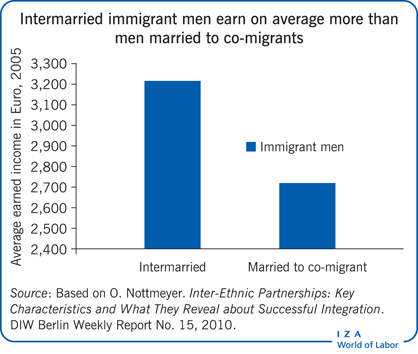Elevator pitch
Marriages between immigrants and natives (intermarriages) are often associated with economic success and interpreted as an indicator of social integration. Intermarried immigrant men are on average better educated and work in better paid jobs than nonintermarried immigrant men. In this context, native spouses could deliver valuable insights into the host country and provide business contacts. However, intermarriage may not be the driving factor of economic success but instead be its byproduct, as better education and personal characteristics could be both economically beneficial and increase the likelihood of meeting natives. Intermarriage might also be more “suspense-packed” (positively and negatively) and can thus be associated with an increase in severe stress and a higher risk of divorce.

Key findings
Pros
Intermarriage is more prevalent among second-generation immigrants and indicates high social integration.
Intermarried immigrant men have on average better education and language skills and earn more than nonintermarried immigrant men.
Intermarried immigrant men are more likely to live outside ethnic enclaves, suggesting that they are better able to adapt to a new social environment.
Native spouses can provide access to social networks that help their immigrant partner enter paid employment or remain successful when self-employed.
Cons
The native spouse might not be the driving factor of economic success but one of its consequences, because the direction of causality is not clear.
Intermarried immigrants are less likely to enter self-employment/entrepreneurship.
There is a higher risk of divorce in intermarriage, indicating a high level of stress from, say, stigma and social pressure.
There seem to be fewer benefits from intermarriage for women and natives, possibly reflecting the different role of intermarriage in the prevalent social norms.